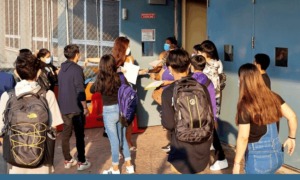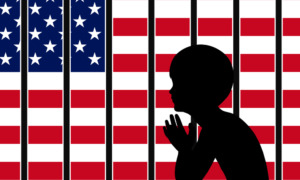Richmond, Va.—When youth baseball coaches cite the names of the men who taught them the game, they touch on the special continuity that’s needed to keep baseball alive among youth.
This continuity has been broken in many black neighborhoods, but not around the headquarters of the Metropolitan Junior Baseball League on Richmond’s south side.
Coaches who have brought two vanloads of youngsters for a late winter workout at the league’s new indoor batting cages launch into recollections of their own days as young players. Fondly, they list the names of their first baseball coaches.
“It was Charlie Synor,” says George Mills, who owns a dry cleaning business and coaches a team of 16-to-18-year-olds.
“It was Mr. Garther,” says Larry Robinson, a computer operator and volunteer youth coach. “Baseball was the first game I learned how to play. We’d all get together in the neighborhood. Sometimes, the kids had to play the men, and maybe the men would cheat, but it was fun.”
Both coaches grew up here and played in the Metropolitan Junior League, founded in 1966, before youth sports in Virginia’s capital city were fully integrated. “We started back in the days of segregation,” says William Forrester, the league’s executive director and son of one of the league’s co-founders. “There weren’t any of the standard youth leagues for black kids.”
Denied access to other youth sport leagues, black neighborhoods created their own, and Metropolitan’s organizers say they’ve struggled over the decades to raise money and gain respect. But they’ve kept baseball alive, which has not been the case in some cities.
Metropolitan became affiliated with the Major League Baseball’s RBI program in 1993; RBI gave the program an $8,000 grant the first year and $4,000 the next. Forrester insists that RBI also brought something worth more than the cash: “RBI gave us credibility – we could say we represented the city of Richmond in Major League Baseball’s junior baseball program.”
But the league still has its struggles.
Shrinking Success
These days, league organizers say, it’s hard to find coaches and volunteers or decent fields to play on. None of the city fields that are available to the league have grass infields; only one has an outfield fence. Similar complaints are voiced in many other cities.
This year, the league will field 24 teams in age groups running from five to 18. The number of teams is down from years past, when the league had more than 30. This stems primarily from the problem of finding funds, and finding volunteers to coach and umpire games, Forrester said. The shortage of coaches and umpires means that the league is happy to be designated as a “community service” that non-violent offenders do as part of their court sentences.
Still, when the RBI World Series opens in Florida this August, the Richmond All-Stars will likely be one of the teams, as Richmond teams have been every year but one since 1993. In 1996 Richmond reached the final game in the RBI World Series, losing 6-4 to San Juan, Puerto Rico.
Richmond’s success is especially impressive for a league not in a Major League city. Some of the credit goes to bingo.
Kids at the Cage
The Metropolitan League projects a $58,000 budget for this season, including $8,500 for its after-school tutorial program and $4,700 for an indoor batting cage setup. Then come outlays for uniforms, equipment, field trips and tournaments.
The league does not charge youngsters to play. Besides grants and donations, its money comes from twice weekly bingo games. The largest room at league headquarters doubles as a batting cage and bingo hall, and bingo surely saved baseball for many a Richmond youngster.
But volunteer youth worker Forrester wishes the league could survive without bingo revenue. By law, charity bingo games must be run by unpaid volunteers, which are hard to find. Forrester also wishes the league could pay coaches, thus assuring that more would show up when needed.
But Forrester and others are proud of the recent addition of the two batting cages that fill the room when the bingo tables are folded away. “I dare say you can’t find two 100-mile-per-hour pitching machines in most black neighborhoods in the country,” he says.
Metropolitan coaches believe that the batting cages help balance the competitive advantage that teams in the Deep South and West seem to gain by being able to play year-round. The machines also give the program – and baseball – a year-round hold on kids’ attention.
Around the batting cages, even in March with basketball playoffs at the top of the day’s sports news, youngsters debate which is the best sport of all. The votes are divided between baseball, basketball and football.
Among these kids, baseball is thrilled to be in the running again.

























